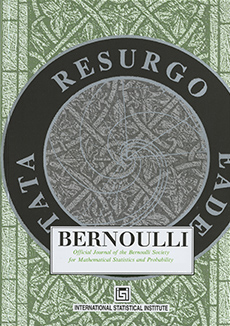Abstract
Consider a partition of the real line into intervals by the points of a stationary renewal point process. Subdivide the intervals in proportions given by i.i.d. random variables with distribution $G$ supported by $[0,1]$. We ask ourselves for what interval length distribution $F$ and what division distribution $G$, the subdivision points themselves form a renewal process with the same $F$? An evident case is that of degenerate $F$ and $G$. As we show, the only other possibility is when $F$ is Gamma and $G$ is Beta with related parameters. In particular, the process of division points of a Poisson process is again Poisson, if the division distribution is Beta: $\mathrm{B} (r,1-r)$ for some $0<r<1$.
We show a similar behaviour of random exchange models when a countable number of “agents” exchange randomly distributed parts of their “masses” with neighbours. More generally, a Dirichlet distribution arises in these models as a fixed point distribution preserving independence of the masses at each step. We also show that for each $G$ there is a unique attractor, a distribution of the infinite sequence of masses, which is a fixed point of the random exchange and to which iterations of a non-equilibrium configuration of masses converge weakly. In particular, iteratively applying $\mathrm{B} (r,1-r)$-divisions to a realisation of any renewal process with finite second moment of $F$ yields a Poisson process of the same intensity in the limit.
Citation
Anton Muratov. Sergei Zuyev. "Neighbour-dependent point shifts and random exchange models: Invariance and attractors." Bernoulli 23 (1) 539 - 551, February 2017. https://doi.org/10.3150/15-BEJ755
Information





